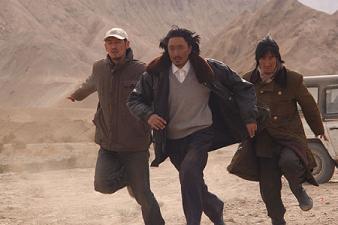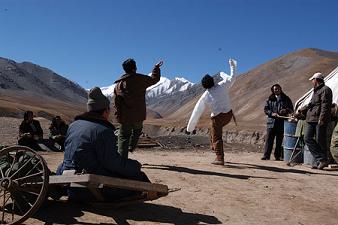Kekexili: Mountain Patrol


In the 1990s, Tibetan volunteers formed volunteer patrols to stop poachers from hunting and killing the endangered Tibetan antelope. The fur of the antelope was prized for its quality, and centuries of poaching was decimating the species. The Tibetan antelope lives Kekexili, a large reserve in China near the Tibetan border. It is nearly three miles high, and extremely far removed from most traces of civilization. Kekexili: Mountain Patrol, is a fictional account of one of these patrols.
The film shows how difficult life was for these men. They had little legal authority and their pay was sporadic at best. The nature reserve is huge, fraught with quicksand, and nearly impenetrable during a snowstorm. Lack of money also meant a lack of supplies, so any prolonged treks or chases could prove dangerous. Reporter Ga Yu (Lei Zhang) learns of the Mountain Patrol and their efforts and travels there to write a story about them. Yu's aim is similar to director Lu Chuan's (The Missing Gun) - to give publicity to the plight of the Tibetan antelope in order to foster greater conservation efforts. Chuan tells the story of the Mountain Patrol through the eyes of Yu, an outsider.
Ritai (Duobuji), the leader of the patrol, agrees to bring Yu along. Chuan shows how different the life of a patrolman can be. They can sit around for long stretches of time at home doing little. Then, in the middle of the night, they'll leave within minutes. The plot of Kekexili is actually pretty depressing. Ritai and his men track down a group of poachers and begin chasing them. They can see through most people's lies, and make sure to check coat linings for hidden skins. Most of the film is a desperate race across the land, with Ritai trying to catch the poachers before they escape. The chase literally becomes a matter of life or death. As they move further into the preserve, they move further away from food and supplies. The patrol has prisoners with them, which means their food supply will run out faster. A turn in the weather causes a snowstorm, endangering everybody.
Chuan then does an interesting thing. Instead of trying to whitewash or tell a happy story, he opts to go for the oppressingly bleak. Kekexili turns into a depressing story. Instead of turning the viewer away, this has the effect of shining a greater spotlight on the Tibetan antelope. People are literally fighting for their lives to save this animal. And Chuan portrays flaws in both sides of the battle. The movie also shows the sparse beauty of the Kekexili reserve, which manages to look inviting even with all of its inherent dangers.